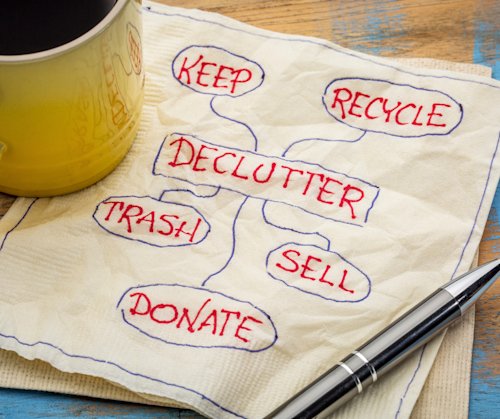The concept of Swedish death cleaning has received a lot of media attention lately, most likely because of the reality TV show The Gentle Art of Swedish Death Cleaning, produced by American actress and comedian Amy Poehler. But what is Swedish death cleaning and how is it related to funeral planning?
What is Swedish death cleaning?
The practice of death cleaning is popular across Scandinavia, but particularly in Sweden where it is called Döstädnings. The simple aim is to remove the clutter from your home before you die, lessening the burden on your loved ones after you’ve gone.
It has long been a common undertaking for Swedes to streamline their lives as they get older. International interest was initially sparked by the author Margareta Magnusson, who coined the term death cleaning in her 2017 book Dostadning: The Gentle Art of Swedish Death Cleaning.
Magnusson wrote the book after losing her mother and husband. She realised then that having to sort through ‘housefuls of clutter and useless possessions’ makes the grieving process even harder.
In her book, Magnusson advises anyone 65 and over to organise and declutter their homes. Her key message is that by sorting the family heirlooms from the junk, you are saving your loved ones from the difficult task of deciding what to keep and what to let go after you’ve died.
“With Swedish Death Cleaning, you’ll have already done that for them by only holding onto items you've determined to be essential,” writes Ashley Knierim on homecare website The Spruce.
Start small
Although Magnusson targets her death-cleaning advice at older people, she says it can’t hurt to begin younger. Whatever your age, Swedish death cleaning can be used to help you take stock of what's important.
As featured in the i online, Sophie Morris, who started death cleaning in her 40s, says “as you consider and confront mortality – something British people are notoriously squeamish about – you also enhance the time you have left and let your loved ones know they have been thought about too.”
The general advice is to start small. Avoid things that may hold sentimental value initially and start with clothing, donating anything that doesn’t fit or suit you anymore. Beyond your wardrobe, a more general rule is to prioritise getting rid of bigger items, like broken furniture or appliances.
The death cleaning mindset also applies to buying new things: Be more intentional about what you buy to avoid creating clutter for the future. And while family or friends might not get why you’re already thinking about what you want to leave behind, they will appreciate being asked what they would like you to keep to remember you by.
However, The Spruce’s Knierman says there’s no right or wrong way to do Swedish death cleaning. “As long as you’re paring down the clutter around your home and surrounding yourself with the most meaningful essentials, you’re not only making things easier for your loved ones—you’re living a more purposeful life in the present moment.”
How is Swedish death cleaning related to funeral plans?
Just like Swedish death cleaning, funeral plans are as much about living ‘a more purposeful life’ as they are about death.
By pre-planning your funeral, you’re able to decide what is important to you, making sure your final wishes are carried out exactly as you want them to be. Leaving behind a clear plan for your funeral is especially important as more people opt for non-traditional services.
And, of course, planning and paying for your own funeral in advance removes the need for your family to guess how you wanted things to be at what will be a difficult time for them. Like death cleaning, pre-planning your funeral takes away much of the decision making that surrounds funeral organisation.
Prepaying for the funeral director services included in your plan will also help to ease financial pressures that could be placed on your loved ones by unexpected funeral expenses.
Like Swedish death cleaning, funeral planning gives you the peace of mind to get on and live your life. And it’s a chance to leave behind a well-organised legacy, removing the stress of unclear funeral wishes and the financial stress of unexpected funeral expenses. As Magnusson puts it, “A loved one wishes to inherit nice things from you.”







